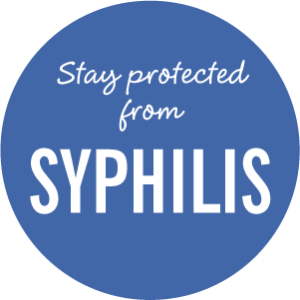
Stay Protected from Syphilis
Over the last year and a half, most of our health education has centered around COVID-19. While the pandemic has certainly affected all of our lives, we want to bring attention to another disease that is quickly spreading around our community—syphilis. Syphilis is a bacterial infection that anyone can contract, so it's important to know what it is and the steps you can take to treat it.
What is Syphilis?
Let's start with the basics. Syphilis is a sexually transmitted disease (STD) that spreads from person to person through sexual contact. When an open syphilitic sore is present during sexual activity, the bacteria from the soar spreads to the other person and shows up where the initial contact was made. This is often around the mouth, vagina, rectum, or penis. While infection is more common in men who have sex with men (MSM), we have seen a growing number of cases in both heterosexual men and women since 2015.
Pregnant women can also pass down syphilis to their baby. This is called congenital syphilis and it happens when a mother contracts the infection and doesn’t undergo treatment to minimize it. Between 2015 and 2019, Spokane County accounted for over 40% of statewide congenital syphilis cases. This is entirely preventable, and we’ll talk about available treatment options later in the blog.

What Are the Symptoms?
Initial symptoms will look like round and painless sores. You can also develop white patches in your mouth, a rash, and experience fatigue, fever, and a sore throat. While the sores fade within three to six weeks regardless of treatment, the rash and other symptoms can come and go over a period of six to eight months. If you think you might have syphilis, we encourage you to reach out to your medical provider about treatment. Syphilis can progress into many other advanced stages if left untreated, causing damage to your nervous system and organs over time.
You can learn more about the stages of syphilis here: STD Facts - Syphilis (Detailed) (cdc.gov)
What Treatment Options are Available?
While the stages and symptoms of syphilis can seem scary, the good news is that it's treatable. Our HIV/STD Prevention team here at SRHD supplies medical providers with doses of penicillin that are specifically made to treat patients with syphilis. It's a long-lasting form of treatment that can prevent the infection from progressing. SRHD can also help you find a location to get tested for STDs and connect you with proper treatment at 509.324.1494.
What Else Should I Know?
You should know that while syphilis is a treatable condition, it can also be a precursor to acquiring HIV. For those who are at highest risk, including MSM, SRHD offers services to get them started on PrEP as well as free HIV/STD testing. To see if you’re eligible for these services, click here: HIV Pre-Exposure Prophylaxis (PrEP) Services | SRHD

Remember to get tested at least once a year for STD's and practice safe sex. This is the best way to avoid a sexually transmitted disease or learn if you need treatment. For more information about testing, treatment, and prevention, click here: HIV/STD Prevention | SRHD
